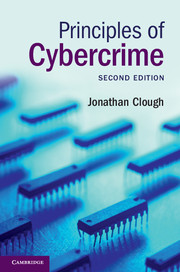Book contents
- Frontmatter
- Contents
- Preface
- Acknowledgements
- Table of Legislation
- Table of Cases
- List of abbreviations
- Part I Introduction
- Part II Computer as target
- 2 Computer as target
- 3 Access offences
- 4 Modification or impairment of data
- 5 Misuse of devices
- 6 Interception of data
- Part III Fraud and related offences
- Part IV Content-related offences
- Part V Offences against the person
- Part VI Jurisdiction
- Bibliography
- Index
3 - Access offences
from Part II - Computer as target
Published online by Cambridge University Press: 05 October 2015
- Frontmatter
- Contents
- Preface
- Acknowledgements
- Table of Legislation
- Table of Cases
- List of abbreviations
- Part I Introduction
- Part II Computer as target
- 2 Computer as target
- 3 Access offences
- 4 Modification or impairment of data
- 5 Misuse of devices
- 6 Interception of data
- Part III Fraud and related offences
- Part IV Content-related offences
- Part V Offences against the person
- Part VI Jurisdiction
- Bibliography
- Index
Summary
Introduction
This first category of offence is concerned with intentional and without right access to the whole or part of a computer system. It is intended to provide the basic offence of ‘dangerous threats to, and attacks against the security … of computer systems and data’. Given the potential breadth of such an offence, parties may require that the offence be ‘committed by infringing security measures, with the intent of obtaining computer data or other dishonest intent, or in relation to a computer system that is connected to another computer system’.
Australia
We have seen that the Australian provisions are classified according to whether they are ‘serious computer offences’ or ‘other computer offences’. In the context of access, the serious computer offence is found in s. 477.1(1)(a)(i) Criminal Code (Cth) which makes it an offence for a person to cause any unauthorised access to data held in a computer, knowing the access is unauthorised, and by that access intending to commit, or facilitate the commission of, a serious offence, by that person or another person. A person may be guilty of this offence even if committing the serious offence is impossible, but it is not an offence to attempt to commit this offence.
In relation to ‘other computer offences’ it is an offence under s. 478.1(1) Criminal Code (Cth) for a person to intentionally cause any unauthorised access to ‘restricted data’, knowing that the access is unauthorised. The significant feature of this provision is that it punishes simple access to data, with no requirement of an intention to commit or facilitate the commission of another offence.
Canada
The Canadian provisions are classified as ‘Offences against Rights of Property’ under Part IX Criminal Code (Can). Unlike the other jurisdictions, these provisions focus on obtaining the use of a computer, rather than access to the computer. Under s. 342.1(1) it is an offence where a person fraudulently and without colour of right:
(a)obtains, directly or indirectly, any computer service …
(c)uses or causes to be used, directly or indirectly, a computer system with intent to commit an offence under paragraph (a) or (b) or under section 430 in relation to computer data or a computer system.
- Type
- Chapter
- Information
- Principles of Cybercrime , pp. 56 - 111Publisher: Cambridge University PressPrint publication year: 2015



